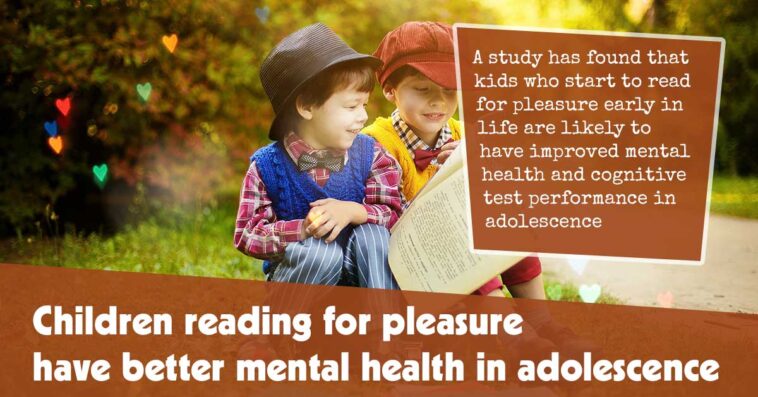Adolescents Who Enjoy Reading Have Enhanced Mental Well-being
Study results on over 10,000 young children have indicated that children who begin reading for pleasure early are likely to benefit in terms of mental health and cognitive test performance during adolescence.
Researchers discovered that 12 hours per week reading was linked to improvements in brain structure. This may help explain the results.
Reading for pleasure can be an enriching and enjoyable activity for children of any age, providing numerous advantages. While spoken and listening language usually develops naturally and rapidly in young people, reading requires deliberate teaching in order to acquire and develop it over time.
Children and adolescents experience brain development during early and middle years, making this an opportune time to establish behaviors that support positive brain health and cognitive growth. Unfortunately, it remains unclear what impact (if any) motivating children from an early age to read could have on mental health, cognition, and brain development when they reach adulthood.
For this research project, information pertaining to more than 10,000 young children enrolled in the Adolescent Brain and Cognitive Development Study was evaluated.
An array of data was analyzed – brain scans, cognitive tests, clinical interviews, behavioral and mental assessments as well as brain imaging tests – from brain scans, cognitive tests, clinical interviews, behavioral and mental assessments as well as brain imaging techniques and comparisons made between children who began reading between 2-9 years of age for pleasure compared to those who started later or never. Many important factors like socio-economic status were taken into consideration and controlled for.
48% of the 10,243 children who were studied reported little reading enjoyment or only started later as children; half experienced between 3-10 years of reading for pleasure.
Researchers discovered a correlation between reading for pleasure at an early age and improved performance on cognitive tests as an adolescent, such as academic achievement in school, speech/memory development and verbal learning.
These children also showed better mental wellbeing, as measured by multiple clinical reports and scores from teachers and parents; their signs of depression and stress had decreased, along with improved attention spans and fewer behavioral problems including rule breaking and aggression.
Children who read for pleasure as toddlers tend to sleep better and spend less time watching television or using a tablet or smartphone throughout the week and weekends as adolescents.
Brain scans of adolescents were examined, and those children who began reading for pleasure at an early age showed slightly larger brain areas and volumes, including certain areas that play essential cognitive function roles as well as areas known to correlate with improved mental health, attention, and behavior.
Reading isn’t simply enjoyable – it has many other benefits too! Reading promotes creativity and thinking skills, reduces stress levels and fosters empathy, as well as being linked with significant developmental factors in children such as improving mental health, brain structure and cognition – which all form the basis of future wellbeing and learning.
As a young child, reading for pleasure was found to provide no additional benefits beyond 12 hours a week; rather, cognitive decline occurred slowly over time as reading time increased; this may be because children spent more time sitting than engaging in cognitively enriching activities like socialization or sports.
